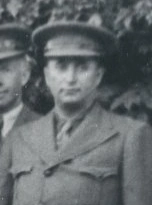More languages
More actions
(Added sources and went into greater detail about Gál's actions) Tag: Visual edit |
No edit summary Tag: Visual edit: Switched |
||
| Line 1: | Line 1: | ||
{{infobox person|name=János Gálicz|image=János Gálicz.webp|birth_date=1890|death_date=20 October 1939 (aged 49)|death_place=[[Moscow]], [[Russian Soviet Federative Socialist Republic (1917–1991)|Russian SFSR]], [[Union of Soviet Socialist Republics (1922–1991)|Soviet Union]]|birth_place=[[Tótkomlós]], [[Békés County]], [[Lands of the Crown of Saint Stephen]], [[Austro-Hungarian Monarchy (1867–1918)|Austria-Hungary)]]|nationality=Hungarian|caption=Photo of | {{infobox person|name=János Gálicz|image=János Gálicz.webp|birth_date=1890|death_date=20 October 1939 (aged 49)|death_place=[[Moscow]], [[Russian Soviet Federative Socialist Republic (1917–1991)|Russian SFSR]], [[Union of Soviet Socialist Republics (1922–1991)|Soviet Union]]|birth_place=[[Tótkomlós]], [[Békés County]], [[Lands of the Crown of Saint Stephen]], [[Austro-Hungarian Monarchy (1867–1918)|Austria-Hungary)]]|nationality=Hungarian|caption=Photo of Gálicz taken in November 1937|known=His actions during the Spanish Civil War|death_cause=Execution by shooting}} | ||
'''János Gálicz''' (1890 – 20 October 1939), also known as '''José Ivanovich Gal''' | '''János Gálicz''' (1890 – 20 October 1939), also known as '''José Ivanovich Gal''', '''General Gal''', or '''Gall''', was a [[Austro-Hungarian Monarchy (1867–1918)|Hungarian]]-[[Union of Soviet Socialist Republics (1922–1991)|Soviet]] commander of the [[Spanish Civil War]]. | ||
Gálicz | Gálicz served in the [[Land Forces of Austria-Hungary|Austro-Hungarian Army]] during [[First World War|World War I]]. He was captured by the [[Russian Empire (1721–1917)|Russians]], became a [[Marxism|Marxist]], and fought in the [[Workers' and Peasants' Red Army|Red Army]] during the [[Russian Civil War]]. He also participated in [[Béla Kun]]'s [[Republic of Councils in Hungary (1919)|Hungarian Soviet Republic]], although he was forced into exile to [[Russian Soviet Federative Socialist Republic (1917–1991)|Russia]] after the republic collapsed. | ||
Gal gained infamy for his actions as commander of the [[XV International Brigade]]. During the [[Battle of Jarama]] in 1937, he sent hundreds of his own men to their deaths in what [[Ernest Hemingway]] later described as an "idiotic, stupidly conceived and insanely executed attack"<ref name=":0">[[Gustav Regler|Regler, Gustav]]; [[Ernest Hemingway|Hemingway, Ernest]]; [[Whittaker Chambers|Chambers, Whittaker]]; [[Henry Hay (writer)|Mussey, June Barrows]] (1940).: ''The Great Crusade''. Longmans, Green & Co. New York. p. vii.</ref> on [[Pingarrón|Pingarrón Hill]], also dubbed "Suicide Hill",<ref>[[Tom Wintringham|Wintringham, Thomas Henry]] (1940).: [https://www.marxists.org/archive/wintringham/1940/02/jarama.htm ''Comrades of Jarama'']. [[Volunteer for Liberty|''Volunteer for Liberty'']]. p. 4.</ref> throwing outnumbered and inexperienced troops at a heavily-fortified uphill enemy position, against the advice of his subordinates.<ref>[[Marion Merriman|Merriman, Marion]] (1986).: [https://www.washingtonpost.com/archive/entertainment/books/1986/06/29/for-whom-the-bell-tolled/a54132bb-9231-4a43-9a2d-a0a81f46e595/ ''For Whom the Bell Tolled'']. [[The Washington Post|''The Washington Post'']].</ref> Hemingway wrote that "He [Gálicz] should have been shot at the time."<ref name=":0" /> | |||
Gálicz later served as the commander of the [[15th Division (Spain)|15th Division]]. | |||
Gálicz was removed from his position after the "deplorable" conditions in his sector became known, and in 1939, after he returned to the Soviet Union, he was tried by a people's court and sentenced to death by shooting.<ref name=":0" /> The sentence was carried out on 20 October 1939. | |||
== References == | == References == | ||
[[Category: | [[Category:Austro-Hungarian military personnel of World War I]] | ||
[[Category: | [[Category:Hungarian anti-fascists]] | ||
[[Category:Hungarian communists]] | [[Category:Hungarian communists]] | ||
[[Category:Red_Army_officers]] | |||
[[Category:Soviet military personnel of the Russian Civil War]] | |||
[[Category:Soviet military personnel of the Spanish Civil War]] | |||
Revision as of 19:48, 23 January 2024
János Gálicz | |
|---|---|
 Photo of Gálicz taken in November 1937 | |
| Born | 1890 Tótkomlós, Békés County, Lands of the Crown of Saint Stephen, Austria-Hungary) |
| Died | 20 October 1939 (aged 49) Moscow, Russian SFSR, Soviet Union |
| Cause of death | Execution by shooting |
| Nationality | Hungarian |
| Known for | His actions during the Spanish Civil War |
János Gálicz (1890 – 20 October 1939), also known as José Ivanovich Gal, General Gal, or Gall, was a Hungarian-Soviet commander of the Spanish Civil War.
Gálicz served in the Austro-Hungarian Army during World War I. He was captured by the Russians, became a Marxist, and fought in the Red Army during the Russian Civil War. He also participated in Béla Kun's Hungarian Soviet Republic, although he was forced into exile to Russia after the republic collapsed.
Gal gained infamy for his actions as commander of the XV International Brigade. During the Battle of Jarama in 1937, he sent hundreds of his own men to their deaths in what Ernest Hemingway later described as an "idiotic, stupidly conceived and insanely executed attack"[1] on Pingarrón Hill, also dubbed "Suicide Hill",[2] throwing outnumbered and inexperienced troops at a heavily-fortified uphill enemy position, against the advice of his subordinates.[3] Hemingway wrote that "He [Gálicz] should have been shot at the time."[1]
Gálicz later served as the commander of the 15th Division.
Gálicz was removed from his position after the "deplorable" conditions in his sector became known, and in 1939, after he returned to the Soviet Union, he was tried by a people's court and sentenced to death by shooting.[1] The sentence was carried out on 20 October 1939.
References
- ↑ 1.0 1.1 1.2 Regler, Gustav; Hemingway, Ernest; Chambers, Whittaker; Mussey, June Barrows (1940).: The Great Crusade. Longmans, Green & Co. New York. p. vii.
- ↑ Wintringham, Thomas Henry (1940).: Comrades of Jarama. Volunteer for Liberty. p. 4.
- ↑ Merriman, Marion (1986).: For Whom the Bell Tolled. The Washington Post.
